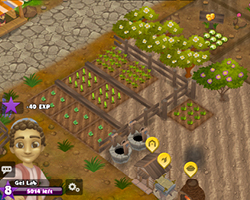Meaningful Play in the Digital Age
- Brian Winn, M.S.
- Associate Professor, Department of Media and Information
- Director, Games for Entertainment and Learning Lab
- College of Communication Arts and Sciences

Kerem B'Yavneh: Come Sow the Seeds of Torah
From children tossing a stick in the yard to grand masters facing off across a chessboard, people like to play games. Since the advent of computers, the ways many people choose to play has changed. In 2016, the Entertainment Software Association reported that 63 percent of households in the United States have at least one person playing three or more hours of video games every week. In 2015, consumers spent $23.5 billion on computer gaming.
While many video games are developed purely as entertainment, there are people developing games for learning and other outcomes. Here at Michigan State, the Games for Entertainment and Learning (GEL) Lab works with external partners to create "serious" games, games that are designed to generate meaningful outcomes for those who play them. Through its partnerships, the Lab seeks to advance knowledge about the effects of digital games on people and society. Graduate and undergraduate students are employed and afforded opportunities to extend their learning through project research and development.
Brian Winn is an associate professor in the College of Communication Arts and Sciences, a principal investigator in the Communication Technology Lab at MSU, and director of the GEL Lab. His work reflects the observation made by Dutch historian Johan Huizinga that "all play means something."
"Anyone who has children or pets can attest that play is a form of problem-solving," said Winn. "It is innate within us, this need to play as a method of learning. Games impose formal rules on play to create goals and objectives and thereby structure that play for a specific purpose."
The Game: Kerem B'Yavneh: Come Sow the Seeds of Torah
The GEL Lab has created some 30 games so far, two of which were developed in partnership with the Frankel Jewish Academy in West Bloomfield, Michigan. The first is called "Sparks of Eternity: Save the Oral Torah from the Fall of the Second Temple." The game takes place during one of the most defining events in Jewish history, the Great Revolt against Rome in 66 C.E. The revolt resulted in the sacking of Jerusalem, the destruction of its temple, and the dissolution of the Jewish state. Taking on the role of a talmid (a rabbi's disciple), players try to preserve the Oral Torah—the tradition that interprets, and at times expands upon, the law given through the Written Torah—as the city is under siege. They must meet with historical characters and plan their escape from the city.
One of the challenges of developing this game was that the school did not want to alter history. Though changing historic events might have undermined the game's intrinsic history lesson, not allowing players to change the story's outcome created an "experience on rails," as Winn described it. As a result, the gameplay was limited to a couple of hours, at most.
The second project undertaken through partnership with Frankel Jewish Academy was "Kerem B'Yavneh: Come Sow the Seeds of Torah." After the fall of Jerusalem, Jewish religious leaders established new centers for the preservation of their faith. One of those was in Yavneh (about 30 miles west-northwest of Jerusalem). Inspired by the popular game, FarmVille, players work to build up the religious community at Yavneh by growing food, buying and selling, and going on quests. As part of the game's ancient agricultural community, they become scholar-farmers.
"Rather than hours of gameplay, this new game offers infinite gameplay," Winn said.
This game also offers some tools that let educators customize the experience for students. For example, teachers can control the questions asked by the rabbi—a character in the game who asks questions and tests players' knowledge. Answering questions and meeting in-game challenges gives players in-game rewards, but teachers can also create out-of-game challenges (research a question, write an essay, etc.) that will give student in-game rewards. The strategy is similar to the way many of the games people play on their smart phones are monetized. Those games are often free, but players can purchase in-game-rewards such as extra lives or virtual currency that can be used to buy advantages in the game. Instead of money, however, students exchange work for rewards.
Rabbi Reuven Margrett, director of Jewish Studies at the Frankel Jewish Academy, said that Kerem B'Yavneh was developed to engage middle school, or young high school, students who are being introduced to the study of Jewish history. He describes the game as "the first serious Jewish educational game at this level of immersion and game mechanics."
"The goal of the game is to experience the lifestyle and challenges of people living in ancient Israel," says Margrett. "Students are also experiencing challenges and accountability with their peers."
No one at the GEL Lab working on these games was an expert in Jewish history. As with most games the Lab develops, that content expertise comes from external partners. Similarly, funding for game development also comes from external partners, in this case from the Frankel Jewish Academy.
"It's one of the things we do well," said Winn. "We partner with different subject experts and work with them." Other partners have included NASA and the National Institute for Health, the MSU Federal Credit Union, and the MSU College of Law.
Both "Kerem B'Yavneh" and "Sparks of Eternity" are available free on multiple platforms. See the Jewish Gaming website for specifics.
- Written by Matthew Forster, University Outreach and Engagement
- Images courtesy of MSU College of Communication Arts and Sciences